环境污染治理---英文版
- 格式:ppt
- 大小:181.00 KB
- 文档页数:6
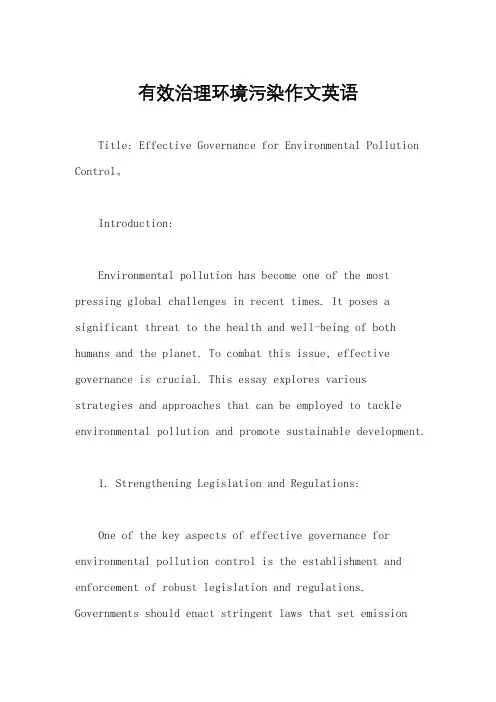
有效治理环境污染作文英语Title: Effective Governance for Environmental Pollution Control。
Introduction:Environmental pollution has become one of the most pressing global challenges in recent times. It poses a significant threat to the health and well-being of both humans and the planet. To combat this issue, effective governance is crucial. This essay explores variousstrategies and approaches that can be employed to tackle environmental pollution and promote sustainable development.1. Strengthening Legislation and Regulations:One of the key aspects of effective governance for environmental pollution control is the establishment and enforcement of robust legislation and regulations. Governments should enact stringent laws that set emissionstandards, waste management guidelines, and penalties for non-compliance. These regulations must be regularly reviewed and updated to keep pace with evolving environmental concerns and scientific advancements.2. Promoting Environmental Education and Awareness:Education plays a vital role in fostering a culture of environmental responsibility. Governments should invest in comprehensive environmental education programs from an early age, ensuring that citizens understand the consequences of pollution and the importance of sustainable practices. By raising awareness about the impacts of pollution, individuals can make informed choices and actively participate in pollution control efforts.3. Encouraging Technological Innovations:Governments should incentivize research and development in clean technologies and sustainable practices. Funding and grants can be provided to businesses and institutions engaged in developing innovative solutions to mitigatepollution. By promoting technological advancements, governments can facilitate the transition towards cleaner industries, reducing pollution levels and promoting sustainable economic growth.4. Strengthening International Cooperation:Environmental pollution knows no boundaries, and its effects are felt globally. Collaboration and cooperation among nations are essential to effectively address this issue. Governments should actively engage in international forums, such as the United Nations Environment Programme,to exchange knowledge, share best practices, and developjoint strategies to combat pollution. By working together, countries can establish global standards and regulationsthat hold everyone accountable for environmental protection.5. Implementing Market-Based Instruments:Market-based instruments, such as pollution taxes and emissions trading systems, can be effective tools for pollution control. Governments can impose taxes onpolluting industries, creating economic incentives for them to reduce emissions and adopt cleaner technologies. Emissions trading systems allow industries to buy and sell pollution permits, encouraging them to invest in cleaner practices. By incorporating market mechanisms, governments can align economic interests with environmental goals.6. Strengthening Monitoring and Enforcement:Governments must establish robust monitoring systems to track pollution levels and ensure compliance with environmental regulations. Regular inspections and audits of industries, waste management facilities, and other potential pollution sources are essential. Strict penalties for non-compliance should be enforced, acting as a deterrent and ensuring that polluters are held accountable for their actions.7. Encouraging Public Participation:Public participation is crucial for effective environmental governance. Governments should activelyinvolve citizens, non-governmental organizations, and other stakeholders in decision-making processes related to pollution control. By incorporating diverse perspectives and expertise, policies can be more comprehensive and effective. Public participation also fosters a sense of ownership and responsibility, encouraging individuals to actively contribute to pollution control efforts.8. Investing in Sustainable Infrastructure:Governments should prioritize investments in sustainable infrastructure, including renewable energy, waste management systems, and efficient public transportation. By promoting the adoption of green technologies and sustainable practices, governments can reduce pollution levels and enhance the overall quality of life. Additionally, investing in sustainable infrastructure creates job opportunities and boosts economic development.Conclusion:Effective governance is essential for combatingenvironmental pollution and ensuring a sustainable future. By strengthening legislation, promoting education and awareness, encouraging technological innovations, fostering international cooperation, implementing market-based instruments, strengthening monitoring and enforcement, encouraging public participation, and investing in sustainable infrastructure, governments can effectively address the challenges posed by pollution. It is only through collective efforts and proactive measures that we can protect the environment, safeguard public health, and secure a sustainable planet for future generations.。
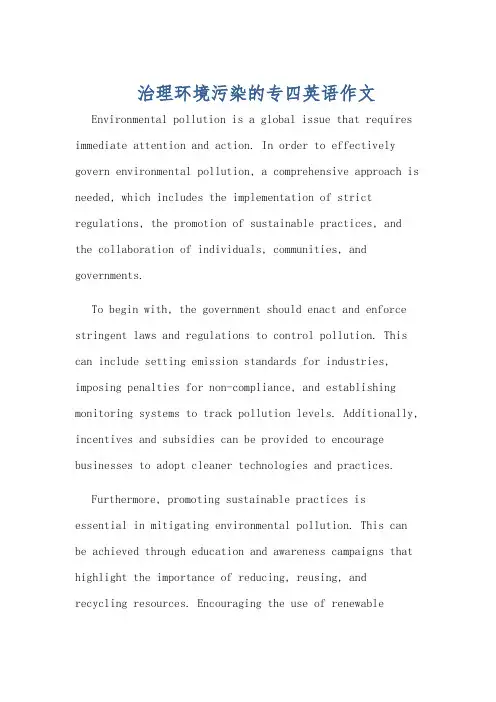
治理环境污染的专四英语作文Environmental pollution is a global issue that requires immediate attention and action. In order to effectively govern environmental pollution, a comprehensive approach is needed, which includes the implementation of strict regulations, the promotion of sustainable practices, and the collaboration of individuals, communities, and governments.To begin with, the government should enact and enforce stringent laws and regulations to control pollution. This can include setting emission standards for industries, imposing penalties for non-compliance, and establishing monitoring systems to track pollution levels. Additionally, incentives and subsidies can be provided to encourage businesses to adopt cleaner technologies and practices.Furthermore, promoting sustainable practices isessential in mitigating environmental pollution. This can be achieved through education and awareness campaigns that highlight the importance of reducing, reusing, andrecycling resources. Encouraging the use of renewableenergy sources and eco-friendly products can alsocontribute to a cleaner and healthier environment.In addition to government efforts, the participation of individuals and communities is crucial in the fight against pollution. By making conscious choices in their daily lives, such as reducing energy consumption, minimizing waste, and supporting environmentally friendly initiatives,individuals can make a significant impact on reducing pollution. Community involvement in clean-up and conservation efforts can also contribute to the improvement of the environment.Lastly, international collaboration is necessary to address environmental pollution on a global scale. Sharing knowledge, technology, and resources among countries can lead to more effective solutions and strategies in combating pollution. Additionally, international agreements and treaties can help in setting common goals and standards for environmental protection.In conclusion, governing environmental pollutionrequires a multi-faceted approach that involves the implementation of strict regulations, the promotion ofsustainable practices, and the collaboration of individuals, communities, and governments. By working together, we can create a cleaner and healthier environment for present and future generations.环境污染是一个全球性问题,需要立即引起关注并采取行动。
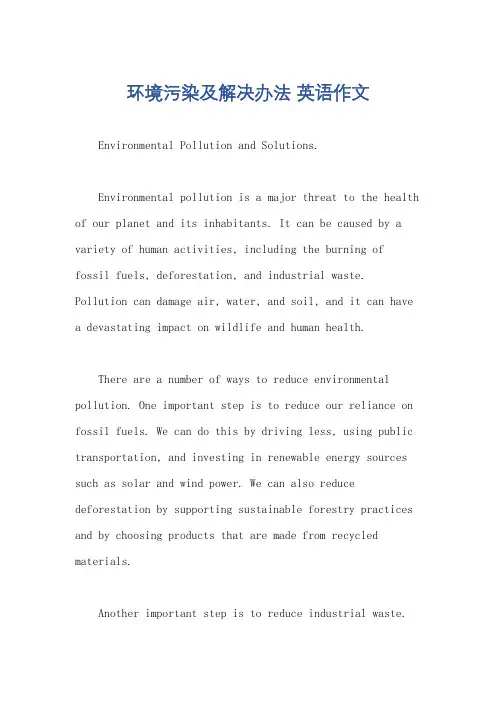
环境污染及解决办法英语作文Environmental Pollution and Solutions.Environmental pollution is a major threat to the health of our planet and its inhabitants. It can be caused by a variety of human activities, including the burning offossil fuels, deforestation, and industrial waste.Pollution can damage air, water, and soil, and it can have a devastating impact on wildlife and human health.There are a number of ways to reduce environmental pollution. One important step is to reduce our reliance on fossil fuels. We can do this by driving less, using public transportation, and investing in renewable energy sources such as solar and wind power. We can also reduce deforestation by supporting sustainable forestry practices and by choosing products that are made from recycled materials.Another important step is to reduce industrial waste.We can do this by implementing stricter regulations on businesses and by encouraging them to adopt more environmentally friendly practices. We can also reduce waste by recycling and composting, and by buying products that are made from recycled materials.Finally, we need to educate ourselves and others about the importance of environmental protection. We can do this by learning about the causes and effects of pollution, and by sharing this information with others. We can also support organizations that are working to protect the environment.By taking these steps, we can help to reduce environmental pollution and protect the health of our planet.环境污染及解决办法。
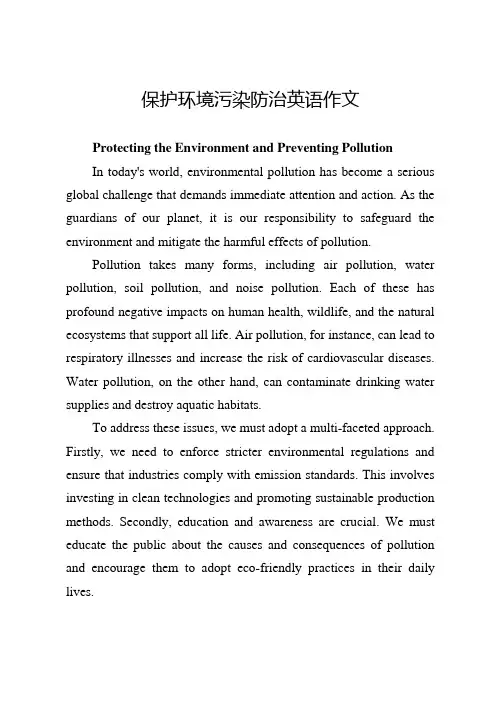
保护环境污染防治英语作文Protecting the Environment and Preventing PollutionIn today's world, environmental pollution has become a serious global challenge that demands immediate attention and action. As the guardians of our planet, it is our responsibility to safeguard the environment and mitigate the harmful effects of pollution.Pollution takes many forms, including air pollution, water pollution, soil pollution, and noise pollution. Each of these has profound negative impacts on human health, wildlife, and the natural ecosystems that support all life. Air pollution, for instance, can lead to respiratory illnesses and increase the risk of cardiovascular diseases. Water pollution, on the other hand, can contaminate drinking water supplies and destroy aquatic habitats.To address these issues, we must adopt a multi-faceted approach. Firstly, we need to enforce stricter environmental regulations and ensure that industries comply with emission standards. This involves investing in clean technologies and promoting sustainable production methods. Secondly, education and awareness are crucial. We must educate the public about the causes and consequences of pollution and encourage them to adopt eco-friendly practices in their daily lives.Moreover, individual actions can have a significant impact. Simple habits like reducing our carbon footprint by using public transportation or cycling, conserving water, and recycling can make a difference. We can also support organizations and initiatives that are working towards environmental protection and pollution prevention.In conclusion, protecting the environment and preventing pollution is a shared responsibility that requires the concerted efforts of everyone. By adopting sustainable practices, enforcing regulations, and raising awareness, we can mitigate the harmful effects of pollution and preserve our planet for future generations. Let us work together to create a cleaner, safer, and more sustainable world.保护环境和防止污染在当今世界,环境污染已成为一个严重的全球性挑战,需要立即引起关注和采取行动。
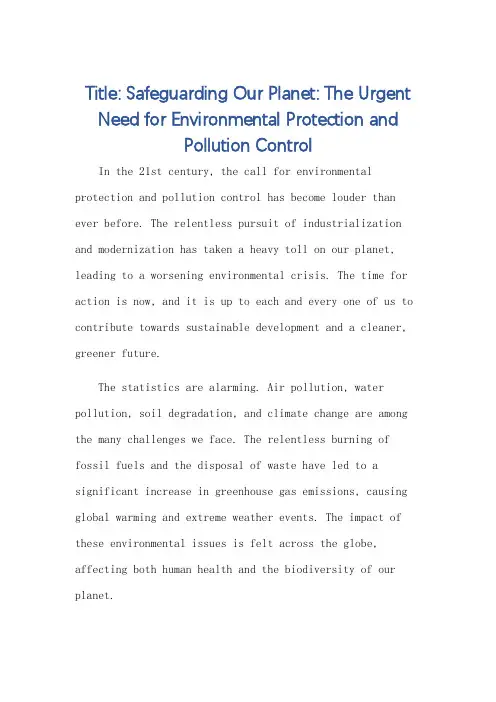
Title: Safeguarding Our Planet: The Urgent Need for Environmental Protection andPollution ControlIn the 21st century, the call for environmental protection and pollution control has become louder than ever before. The relentless pursuit of industrialization and modernization has taken a heavy toll on our planet, leading to a worsening environmental crisis. The time for action is now, and it is up to each and every one of us to contribute towards sustainable development and a cleaner, greener future.The statistics are alarming. Air pollution, water pollution, soil degradation, and climate change are among the many challenges we face. The relentless burning of fossil fuels and the disposal of waste have led to a significant increase in greenhouse gas emissions, causing global warming and extreme weather events. The impact of these environmental issues is felt across the globe, affecting both human health and the biodiversity of our planet.To address these challenges, we must adopt a holistic approach that encompasses both environmental protection and pollution control. We need to prioritize renewable energy sources, reduce our carbon footprint, and adopt sustainable practices in all aspects of our lives. Governments must implement strict environmental regulations and enforce them effectively to ensure that industries and businesses comply with environmental standards.Moreover, education and awareness are crucial in this effort. We need to raise awareness among the public about the importance of environmental protection and the consequences of pollution. By educating people about these issues, we can inspire them to make eco-friendly choices in their daily lives, such as using public transport orcycling instead of private vehicles, reducing waste, and conserving resources.In addition, technological innovation holds the key to addressing environmental challenges. Green technologies and innovative solutions can help us reduce pollution, improve energy efficiency, and conserve resources. For instance, the development of electric vehicles and renewable energysources can help us reduce our dependence on fossil fuels and lower greenhouse gas emissions.However, it is important to recognize thatenvironmental protection and pollution control are not the sole responsibility of governments or businesses. Each individual has a role to play in this effort. Simpleactions like reducing water waste, composting organic waste, and planting trees can have a significant impact on our environment. By making these changes in our daily lives, we can contribute towards building a more sustainable world.In conclusion, the protection of our environment andthe control of pollution are urgent and necessary for the well-being of our planet and its inhabitants. It is ashared responsibility that requires the collective effortof governments, businesses, and individuals. By adopting sustainable practices, prioritizing renewable energy, and raising awareness about environmental issues, we can create a cleaner, greener, and more sustainable future for ourselves and future generations.**守护地球:环境保护与污染治理的迫切需求**在21世纪,环境保护和污染治理的呼声比以往任何时候都更加响亮。
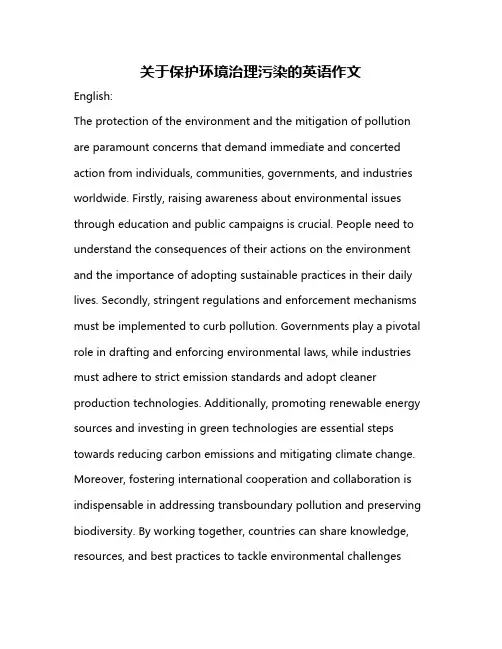
关于保护环境治理污染的英语作文English:The protection of the environment and the mitigation of pollution are paramount concerns that demand immediate and concerted action from individuals, communities, governments, and industries worldwide. Firstly, raising awareness about environmental issues through education and public campaigns is crucial. People need to understand the consequences of their actions on the environment and the importance of adopting sustainable practices in their daily lives. Secondly, stringent regulations and enforcement mechanisms must be implemented to curb pollution. Governments play a pivotal role in drafting and enforcing environmental laws, while industries must adhere to strict emission standards and adopt cleaner production technologies. Additionally, promoting renewable energy sources and investing in green technologies are essential steps towards reducing carbon emissions and mitigating climate change. Moreover, fostering international cooperation and collaboration is indispensable in addressing transboundary pollution and preserving biodiversity. By working together, countries can share knowledge, resources, and best practices to tackle environmental challengeseffectively. Lastly, individual responsibility is paramount. Each person must take accountability for their actions and strive to minimize their ecological footprint by reducing waste, conserving energy, and making environmentally conscious choices. In summary, safeguarding the environment and combating pollution require a multifaceted approach involving education, regulation, innovation, cooperation, and individual commitment.中文翻译:环境保护和减轻污染是全球个人、社区、政府和工业都必须立即共同行动的重要关切。
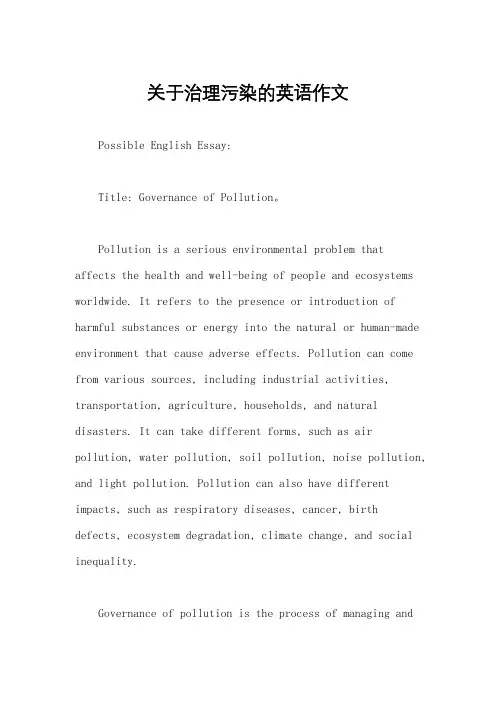
关于治理污染的英语作文Possible English Essay:Title: Governance of Pollution。
Pollution is a serious environmental problem thataffects the health and well-being of people and ecosystems worldwide. It refers to the presence or introduction of harmful substances or energy into the natural or human-made environment that cause adverse effects. Pollution can come from various sources, including industrial activities, transportation, agriculture, households, and natural disasters. It can take different forms, such as air pollution, water pollution, soil pollution, noise pollution, and light pollution. Pollution can also have different impacts, such as respiratory diseases, cancer, birth defects, ecosystem degradation, climate change, and social inequality.Governance of pollution is the process of managing andregulating pollution through policies, laws, institutions, and practices. It involves multiple stakeholders, including governments, businesses, civil society, academia, and individuals. The governance of pollution aims to prevent, reduce, and mitigate pollution by addressing its causes, effects, and risks. It also seeks to promote sustainable development, environmental justice, and public participation. The governance of pollution can be challenging due to the complexity, diversity, and uncertainty of pollution issues, as well as the competing interests and values of different actors.To govern pollution effectively, several strategies and approaches can be used. One of them is the precautionary principle, which states that when an activity or substance may cause harm to human health or the environment, in the absence of scientific consensus, the burden of proof falls on those who propose or undertake the activity or use the substance. This principle implies that prevention is better than cure and that uncertainty should not be an excuse for inaction. Another strategy is the polluter-pays principle, which states that the costs of pollution should be borne bythose who cause it, rather than by society or the victims. This principle implies that polluters should internalize the externalities of their actions and that the prices of goods and services should reflect their environmental impacts. A third strategy is the ecosystem approach, which recognizes that pollution is not a isolated problem but a systemic one that affects the interdependence andresilience of ecosystems and human societies. This approach implies that pollution should be managed in a holistic and integrative way that considers the ecological, social, and economic dimensions of sustainability.The governance of pollution can also benefit from the use of technological innovations and behavioral changes. For example, renewable energy technologies, such as solar, wind, and hydro power, can reduce the emissions of greenhouse gases and air pollutants from fossil fuels. Energy-efficient buildings, appliances, and transportation systems can also save energy and reduce pollution. Recycling, composting, and waste reduction can reduce the amount of waste that goes to landfills or incinerators. Sustainable agriculture practices, such as organic farming,crop rotation, and integrated pest management, can reduce the use of pesticides and fertilizers that pollute water and soil. Behavioral changes, such as carpooling, biking, and walking, can reduce the emissions of transportation pollutants and promote public health. Education, awareness-raising, and advocacy can also empower people to make informed choices and demand accountability from decision-makers.In conclusion, the governance of pollution is a crucial and ongoing challenge for humanity. It requires acollective and comprehensive effort to prevent, reduce, and mitigate pollution and promote sustainable development and environmental justice. The governance of pollution can benefit from various strategies and approaches, such as the precautionary principle, the polluter-pays principle, and the ecosystem approach, as well as technological innovations and behavioral changes. The governance of pollution also requires the participation and cooperation of multiple stakeholders, from governments to individuals, to ensure that the benefits and costs of pollution are distributed fairly and equitably.。
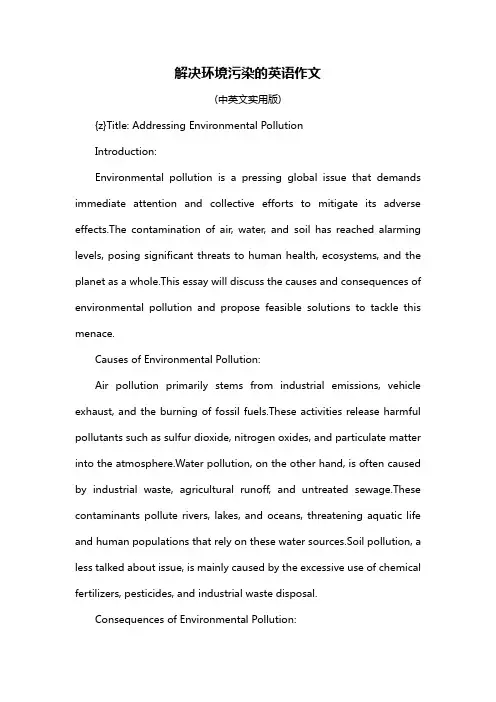
解决环境污染的英语作文(中英文实用版){z}Title: Addressing Environmental PollutionIntroduction:Environmental pollution is a pressing global issue that demands immediate attention and collective efforts to mitigate its adverse effects.The contamination of air, water, and soil has reached alarming levels, posing significant threats to human health, ecosystems, and the planet as a whole.This essay will discuss the causes and consequences of environmental pollution and propose feasible solutions to tackle this menace.Causes of Environmental Pollution:Air pollution primarily stems from industrial emissions, vehicle exhaust, and the burning of fossil fuels.These activities release harmful pollutants such as sulfur dioxide, nitrogen oxides, and particulate matter into the atmosphere.Water pollution, on the other hand, is often caused by industrial waste, agricultural runoff, and untreated sewage.These contaminants pollute rivers, lakes, and oceans, threatening aquatic life and human populations that rely on these water sources.Soil pollution, a less talked about issue, is mainly caused by the excessive use of chemical fertilizers, pesticides, and industrial waste disposal.Consequences of Environmental Pollution:The repercussions of environmental pollution are far-reaching and devastating.Air pollution leads to respiratory diseases, cardiovascular problems, and premature deaths.Water pollution, besides threatening aquatic life, causes waterborne diseases and malnutrition due to the contamination of food sources.Soil pollution affects agriculture, leading to reduced crop yields and the emergence of pesticide-resistant pests.Moreover, pollution disrupts ecosystems, causing the loss of biodiversity and contributing to the phenomenon of climate change.Solutions to Environmental Pollution:To combat environmental pollution, a multi-pronged approach is essential.Firstly, there is a need for stricter regulations and enforcement to limit industrial emissions and promote cleaner ernments should incentivize the adoption of renewable energy sources such as solar, wind, and hydroelectric power to reduce reliance on fossil fuels.Secondly, sustainable agricultural practices should be promoted, including the reduction of chemical inputs and the adoption of organic farming methods.Thirdly, public awareness campaigns are crucial to educate individuals about the importance of conservation and the impact of their actions on the stly, international cooperation is vital to address global environmental issues, as pollution knows no boundaries.Conclusion:Environmental pollution poses a significant threat to humanity and the planet.It is imperative that we act collectively and decisively to mitigate its causes and consequences.By implementing strict regulations, promoting sustainable practices, raising public awareness, and fostering international collaboration, we can take significant steps towards a cleaner, healthier, and more sustainable future.Let us remember that our actions today will determine the well-being of future generations.。
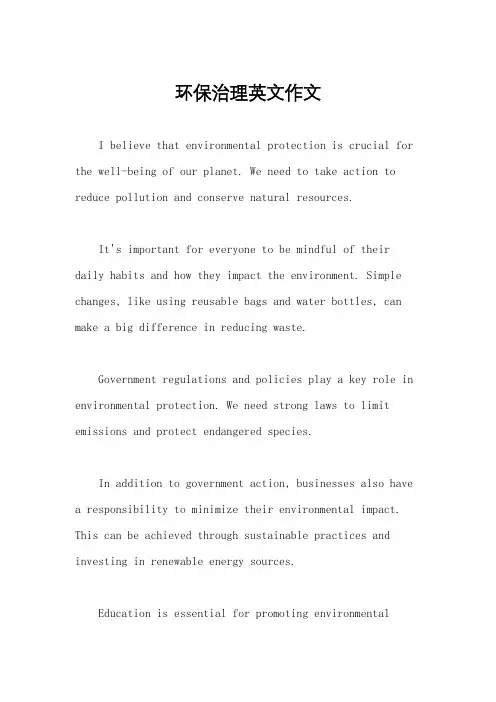
环保治理英文作文I believe that environmental protection is crucial for the well-being of our planet. We need to take action to reduce pollution and conserve natural resources.It's important for everyone to be mindful of their daily habits and how they impact the environment. Simple changes, like using reusable bags and water bottles, can make a big difference in reducing waste.Government regulations and policies play a key role in environmental protection. We need strong laws to limit emissions and protect endangered species.In addition to government action, businesses also have a responsibility to minimize their environmental impact. This can be achieved through sustainable practices and investing in renewable energy sources.Education is essential for promoting environmentalawareness. We need to teach future generations about the importance of conservation and the consequences of neglecting our planet.Individuals can also get involved in environmental protection by participating in clean-up efforts and supporting organizations that work to preserve natural habitats.Ultimately, environmental protection is a collective effort that requires collaboration between individuals, businesses, and governments. We all have a role to play in ensuring a sustainable future for our planet.。
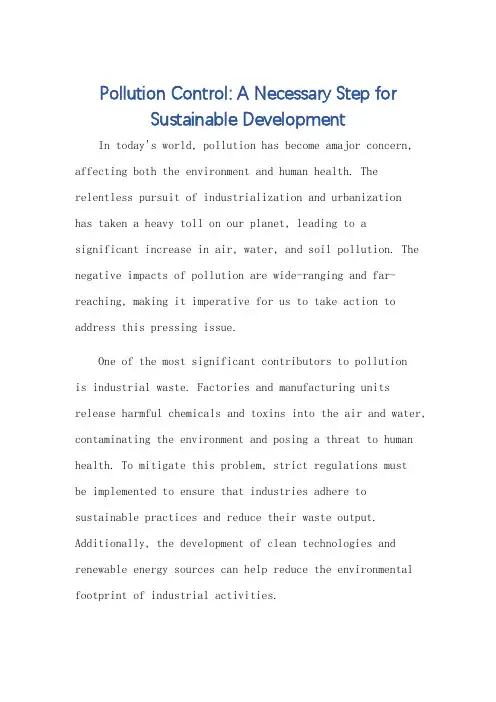
Pollution Control: A Necessary Step forSustainable DevelopmentIn today's world, pollution has become amajor concern, affecting both the environment and human health. The relentless pursuit of industrialization and urbanizationhas taken a heavy toll on our planet, leading to asignificant increase in air, water, and soil pollution. The negative impacts of pollution are wide-ranging and far-reaching, making it imperative for us to take action to address this pressing issue.One of the most significant contributors to pollutionis industrial waste. Factories and manufacturing units release harmful chemicals and toxins into the air and water, contaminating the environment and posing a threat to human health. To mitigate this problem, strict regulations mustbe implemented to ensure that industries adhere to sustainable practices and reduce their waste output. Additionally, the development of clean technologies and renewable energy sources can help reduce the environmental footprint of industrial activities.Another major source of pollution is the excessive use of fossil fuels. The burning of coal, oil, and gas releases large amounts of greenhouse gases into the atmosphere, contributing to global warming and climate change. Transitioning to renewable energy sources such as solar, wind, and hydroelectric power can help reduce greenhouse gas emissions and promote sustainable development. Furthermore, improving energy efficiency and conservation measures can help reduce the demand for fossil fuels and lower the associated pollution.Urbanization and the growth of cities also contribute to pollution. The influx of people into cities leads to increased traffic congestion and the emission of harmful gases from vehicles. To address this issue, cities need to implement sustainable transport systems, such as public transportation, cycling, and walking facilities. Additionally, promoting green building practices and urban greening can help absorb carbon dioxide and improve air quality in cities.Moreover, individual actions also play a crucial role in pollution control. Simple habits like reducing the useof plastic, conserving water, and recycling can help reduce waste and conserve resources. Raising awareness about the importance of sustainable practices and encouraging peopleto adopt eco-friendly lifestyles can have a significant impact on reducing pollution.In conclusion, pollution control is crucial for sustainable development. It requires a concerted effortfrom governments, industries, cities, and individuals to address the root causes of pollution and implementeffective solutions. By adopting sustainable practices, promoting clean technologies, and encouraging eco-friendly lifestyles, we can create a healthier and more sustainable future for ourselves and our planet.**污染治理:可持续发展的必要步骤**在当今世界,污染已成为一个主要问题,对环境和人类健康造成了影响。
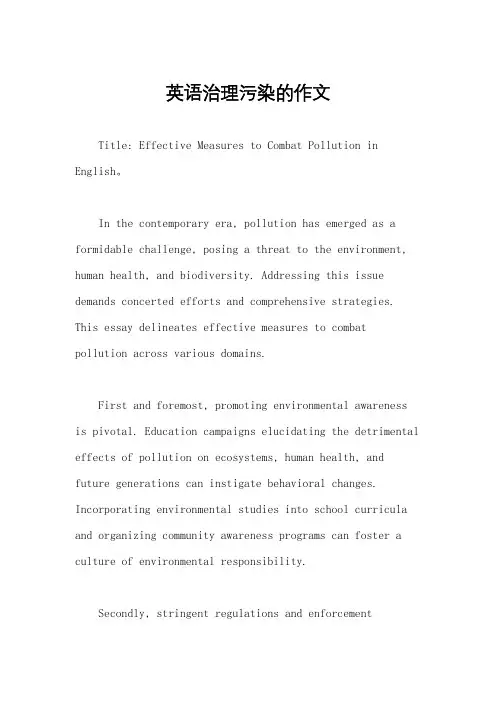
英语治理污染的作文Title: Effective Measures to Combat Pollution in English。
In the contemporary era, pollution has emerged as a formidable challenge, posing a threat to the environment, human health, and biodiversity. Addressing this issue demands concerted efforts and comprehensive strategies. This essay delineates effective measures to combatpollution across various domains.First and foremost, promoting environmental awareness is pivotal. Education campaigns elucidating the detrimental effects of pollution on ecosystems, human health, andfuture generations can instigate behavioral changes. Incorporating environmental studies into school curricula and organizing community awareness programs can foster a culture of environmental responsibility.Secondly, stringent regulations and enforcementmechanisms are imperative. Governments must enact and enforce stringent environmental laws to regulate industrial emissions, waste disposal, and resource extraction. Additionally, incentivizing industries to adopt cleaner production technologies and penalizing non-compliance can serve as deterrents against pollution.Furthermore, fostering technological innovation plays a crucial role in pollution mitigation. Investing in research and development of eco-friendly technologies such as renewable energy, waste recycling, and emission reduction systems can significantly alleviate pollution levels. Moreover, governments should provide financial support and tax incentives to industries that embrace sustainable practices.Moreover, international cooperation is indispensable in combating transboundary pollution. Collaborative efforts among nations to address issues such as cross-border air and water pollution are imperative. Establishing international agreements and frameworks for pollution control and sharing best practices can facilitatecollective action on a global scale.In addition, promoting sustainable consumption and lifestyle choices is essential. Encouraging individuals to adopt eco-friendly habits such as reducing, reusing, and recycling can mitigate pollution at the grassroots level. Furthermore, promoting public transportation, bicycling, and walking over private vehicle usage can curb air pollution and reduce carbon emissions.Additionally, preserving and restoring natural ecosystems play a pivotal role in pollution mitigation. Protecting forests, wetlands, and marine habitats not only sequesters carbon dioxide but also enhances biodiversity and mitigates pollution runoff into water bodies. Moreover, investing in green infrastructure such as green roofs and urban parks can mitigate urban pollution and enhancequality of life.Furthermore, fostering corporate responsibility is paramount in pollution mitigation. Encouraging corporations to adopt sustainable business practices, conductenvironmental impact assessments, and engage in corporate social responsibility initiatives can mitigate pollution from industrial sources. Moreover, consumers can exert pressure on companies by favoring eco-friendly products and boycotting environmentally irresponsible brands.In conclusion, combating pollution necessitates a multifaceted approach encompassing environmental awareness, regulatory frameworks, technological innovation, international cooperation, sustainable consumption, ecosystem preservation, and corporate responsibility. By implementing these measures collectively, societies can mitigate pollution and pave the way for a sustainable future.。
有效治理环境污染英语作文Environmental pollution is a serious problem that we need to tackle. It affects our air, water, and soil, and has long-term consequences for our health and the health of the planet.One effective way to address environmental pollution is to reduce our reliance on fossil fuels. This meansinvesting in renewable energy sources such as solar and wind power, and transitioning to electric vehicles.Another important step is to regulate industrial emissions and waste disposal. Companies should be held accountable for the pollution they produce, and strict regulations should be put in place to limit their environmental impact.Individuals can also make a difference by reducingtheir own carbon footprint. This can be as simple as using public transportation, reducing energy consumption, andproperly disposing of waste.Education is key in the fight against environmental pollution. By raising awareness and promoting sustainable practices, we can empower people to make informed choices that benefit the environment.In addition, governments and internationalorganizations need to work together to develop and enforce policies that protect the environment. This includessetting emissions standards, implementing pollution control measures, and providing support for sustainable development.Ultimately, effective governance of environmental pollution requires a collective effort from individuals, businesses, and governments. By taking action at all levels, we can work towards a cleaner, healthier planet for future generations.。
治理污染英语作文Pollution is a serious problem that needs to be addressed. It affects the air we breathe, the water we drink, and the land we live on. We need to take action to reduce pollution and protect our environment for future generations.One way to tackle pollution is to reduce our use of single-use plastics. These plastics often end up in our oceans and harm marine life. By using reusable bags, bottles, and containers, we can reduce the amount ofplastic waste that ends up in our environment.Another important step in fighting pollution is to invest in clean energy sources. Fossil fuels are a major contributor to air and water pollution. By transitioning to renewable energy sources like solar and wind power, we can reduce our reliance on fossil fuels and decrease pollution levels.In addition to individual actions, governments and businesses also have a responsibility to address pollution. Stricter regulations and enforcement of environmental laws can help reduce pollution from industrial sources. Businesses can also play a role by implementing sustainable practices and reducing their carbon footprint.Education is also key in the fight against pollution. By raising awareness about the impact of pollution and the importance of conservation, we can inspire people to take action and make environmentally-friendly choices in their daily lives.Overall, addressing pollution requires a collective effort from individuals, governments, and businesses. By taking proactive steps to reduce pollution, we can create a cleaner and healthier environment for everyone.。
治理环境英语作文Living in a clean and healthy environment is essential for our well-being. It is important to take care of our surroundings and ensure that we are not contributing to pollution or environmental degradation.One way to contribute to a cleaner environment is by reducing our use of single-use plastics. These products are harmful to the environment and take hundreds of years to decompose. By using reusable bags, bottles, and containers, we can significantly reduce the amount of plastic wastethat ends up in landfills and oceans.Another important aspect of environmental governance is the conservation of natural resources. We must strive to use resources such as water and energy more efficiently and responsibly. This can be achieved through simple actions such as turning off lights and appliances when not in use, fixing leaky faucets, and using water-saving devices.Furthermore, it is crucial to support and participatein local environmental initiatives and community clean-up efforts. By volunteering our time and resources, we can make a positive impact on our immediate surroundings and inspire others to do the same.In addition, advocating for sustainable practices and policies at the local, national, and global levels is essential for effective environmental governance. This includes supporting renewable energy sources, promoting green transportation options, and holding corporations and governments accountable for their environmental impact.Ultimately, taking care of the environment is a collective responsibility that requires the participation and commitment of individuals, communities, and governments. By working together to implement sustainable practices and policies, we can create a cleaner and healthier environment for current and future generations.。
治理污染英文作文Pollution is a serious problem that we need to address. It's causing harm to the environment and affecting our health. We can't just ignore it and hope it goes away.There are many ways to tackle pollution. We can start by reducing our use of single-use plastics and finding alternative, eco-friendly materials. We can also invest in clean energy sources like solar and wind power to reduce our reliance on fossil fuels.Governments and businesses need to take responsibility for their impact on the environment. They should be held accountable for their pollution and be required to take steps to reduce it. This could include implementingstricter regulations and providing incentives for companies to adopt more sustainable practices.Education is also key in the fight against pollution. We need to raise awareness about the issue and empowerpeople to make environmentally friendly choices in their daily lives. By teaching the next generation about the importance of protecting the environment, we can ensure a more sustainable future.It's important for individuals to take action as well. We can all make small changes in our daily lives, like using public transportation, recycling, and conserving energy. Every little bit helps, and if we all do our part, we can make a big difference in reducing pollution.。
环境污染整治英语作文环境污染整治英语(一)Today the quality of our natural environment has become an important issue. The world population is rising so quickly that the world has become too crowded.今天,我们的自然环境质量已经成为一个重要问题。
世界人口增长如此之快,世界已变得过于拥挤。
We are using up our natural resources and at the same time polluting our environment with dangerous chemicals. If we continue to do this, life on earth cannot survive.我们正在利用我们的自然资源,同时污染的危险化学品的环境。
如果我们继续做这个地球上,生活无法生存。
Concerned people have made some progress in environmental protection. Governments of many countries have established laws to protect the air, forests and sea resources and to stop environmental pollution.有关人士取得了一些在环境保护方面的进展。
许多国家的政府已建立了法律保护,空气,森林和海洋资源,并停止对环境的污染。
Still more measures should be taken to solve environmental problems. People should be further educated to recognize the importance of the problems, to use modern methods of birth control, to conserve our natural resources and recycle our products. We are sure that we can have a better and cleaner place in the future.但更应采取措施来解决环境问题。
治理污染英文作文Title: Addressing Pollution: A Comprehensive Approach。
Pollution is a pressing issue that demands immediate attention and effective governance. It poses significant threats to the environment, public health, and the overall well-being of society. To tackle pollution effectively, a multifaceted approach is necessary, incorporating various strategies ranging from policy initiatives to community engagement. In this essay, we will explore different aspects of pollution governance and propose viable solutions.First and foremost, legislative measures play a crucial role in pollution control. Governments need to enact stringent laws and regulations to limit emissions from industries, vehicles, and other sources. These regulations should include strict emission standards, penalties fornon-compliance, and incentives for adopting cleaner technologies. Additionally, regular monitoring andenforcement are essential to ensure compliance with these regulations.Furthermore, promoting sustainable practices is vital for pollution control. Encouraging industries to adopt cleaner production methods, such as recycling and waste reduction, can significantly reduce pollution levels. Similarly, incentivizing the use of renewable energy sources like solar and wind power can help mitigate air and water pollution caused by fossil fuel combustion.Education and awareness-raising efforts are alsocritical components of pollution governance. Educating the public about the adverse effects of pollution and the importance of sustainable living can foster a sense of responsibility and encourage individuals to adopt eco-friendly habits. Schools, media, and community organizations can play a pivotal role in spreading awareness and promoting environmental stewardship.In addition to top-down approaches, bottom-upinitiatives are equally important in addressing pollution.Community participation and grassroots movements can exert pressure on policymakers and industries to prioritize environmental protection. Local initiatives such as clean-up drives, tree planting campaigns, and recycling programs can have a significant impact on reducing pollution at the grassroots level.Moreover, international cooperation is essential for tackling pollution, especially transboundary issues such as air and water pollution. Collaboration between countries is crucial for sharing best practices, coordinating efforts, and addressing cross-border pollution sources.International treaties and agreements can provide a framework for collective action and facilitate the exchange of technical expertise and resources.Investment in research and innovation is another key aspect of pollution governance. Supporting research initiatives aimed at developing cleaner technologies, pollution monitoring systems, and sustainable solutions can drive progress in pollution control. Public and private sector collaboration in research and development can leadto breakthroughs in pollution mitigation and pave the way for a greener future.In conclusion, addressing pollution requires a comprehensive approach that encompasses legislative measures, sustainable practices, education, community involvement, international cooperation, and technological innovation. By adopting such a holistic approach, we can effectively mitigate pollution and create a cleaner, healthier environment for present and future generations. Only through concerted efforts and collective action can we overcome the challenges posed by pollution and build a sustainable future for all.。